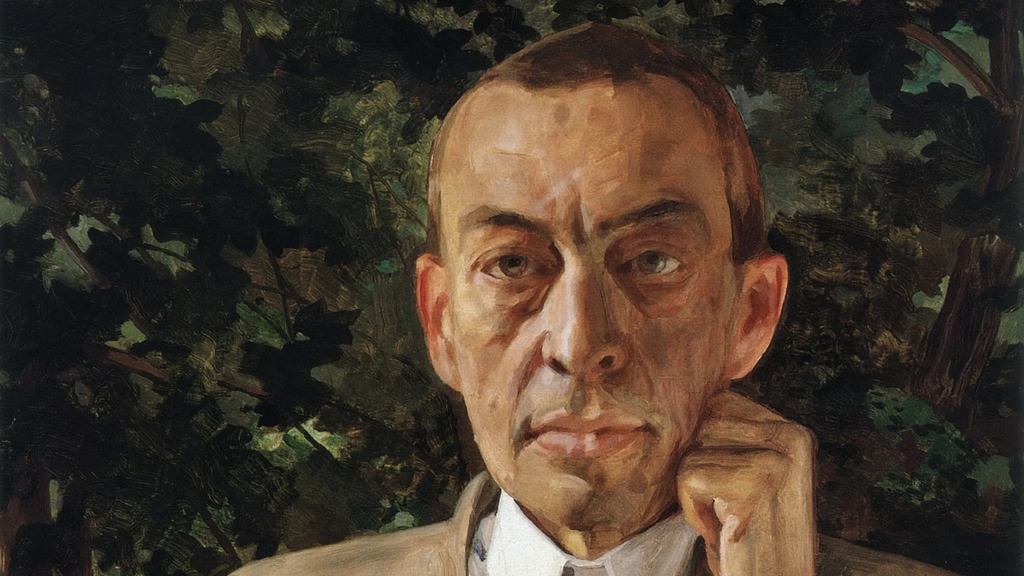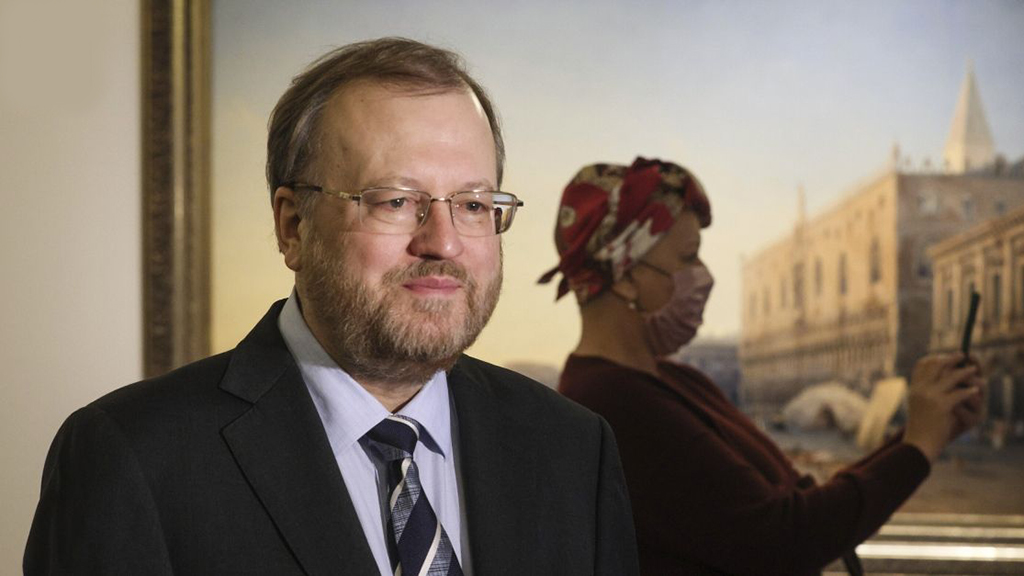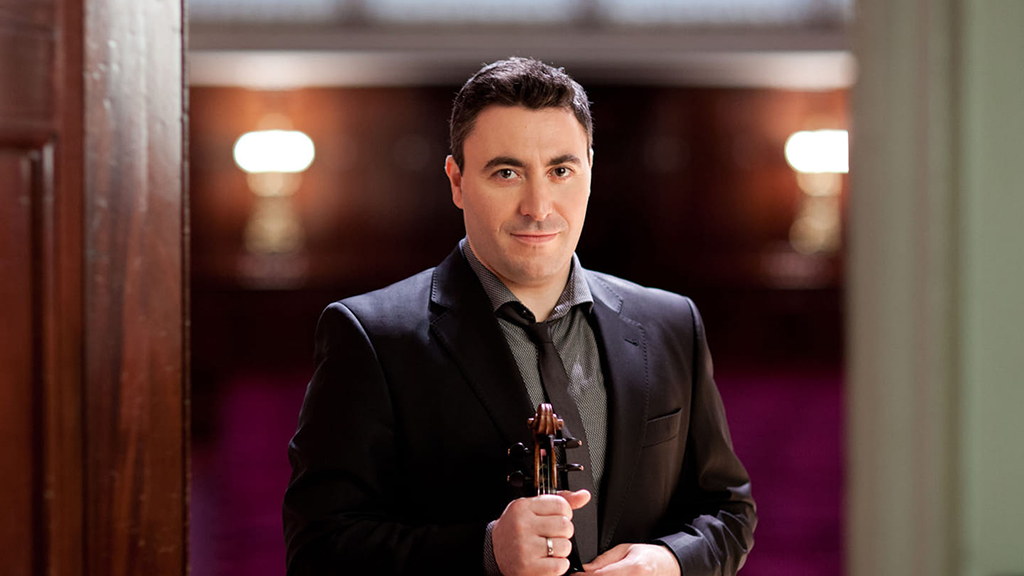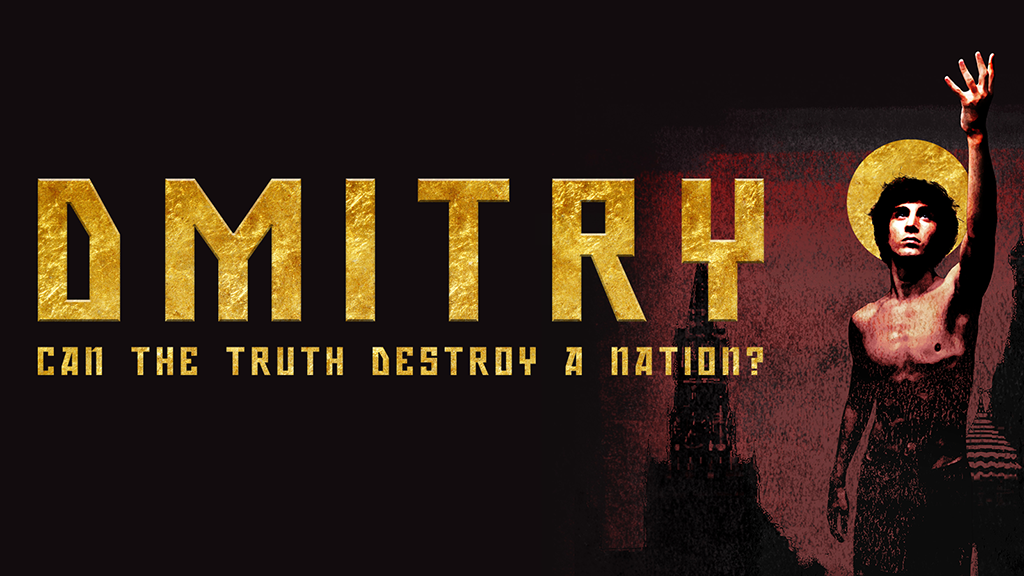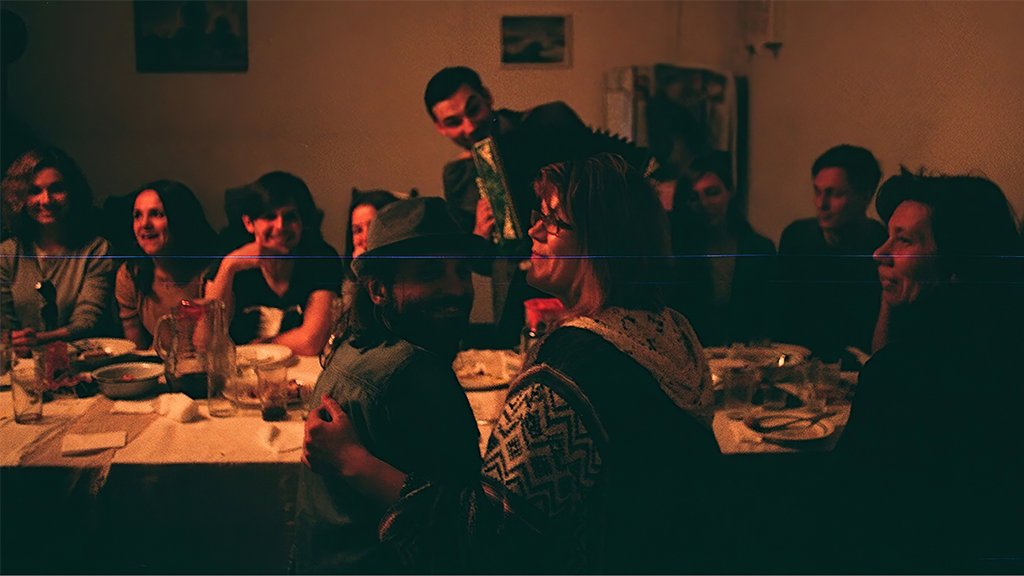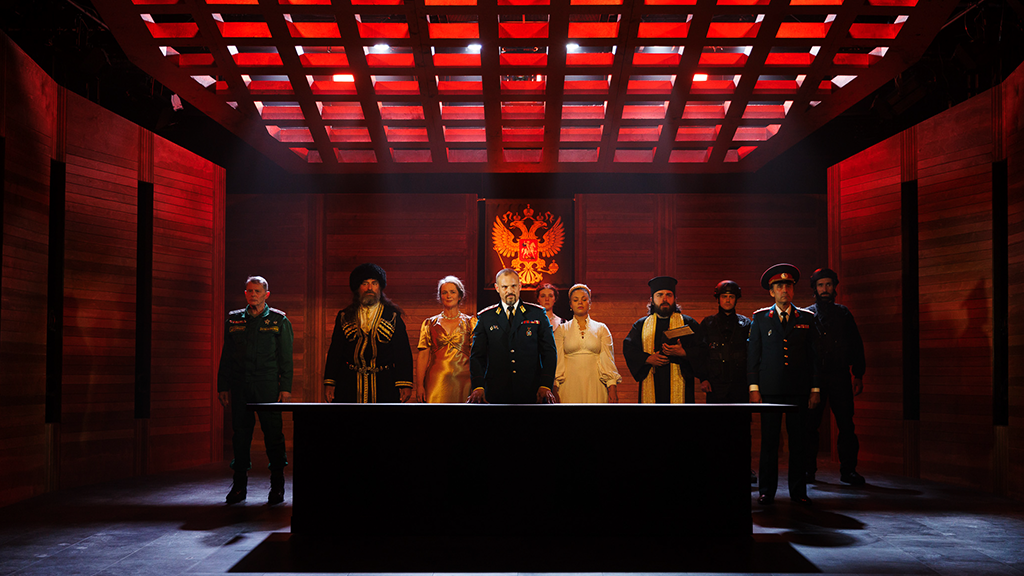
Pretense and intrigue: a new play “Dmitry” in Marylebone Theatre
After an extensive renovation Marylebone Theater (ex-The Rudolf Steiner Theatre) welcomed first guests with a new play about Russian Tsar Dmitry the Pretender. “Dmitry” was written by playwright Peter Oswald in collaboration with Alexander J Gifford, based on the unfinished tragedy Demetrius by Friedrich Schiller, staged by famed director Tim Supple. Afisha.London magazine together with the theatre critic Elena Mamchur studied the historical and artistic context of the new play to make the conclusion – we very much liked it and recommend to see.
The unfinished play Demetrius is little known in Russia and Europe. It was conceived by Schiller when the Weimar crown prince entered a political marriage with the Russian princess Maria Pavlovna, sister of Alexander I. It was assumed that the author, recently granted the title of nobility, would respond with courtesy to his emperor and flatter his new relatives – the Russian imperial court, make the strategic alliance with the Romanovs morally legitimate. “But no, I won’t do it,” Schiller wrote in his working diary. “The work must remain perfectly clean.”
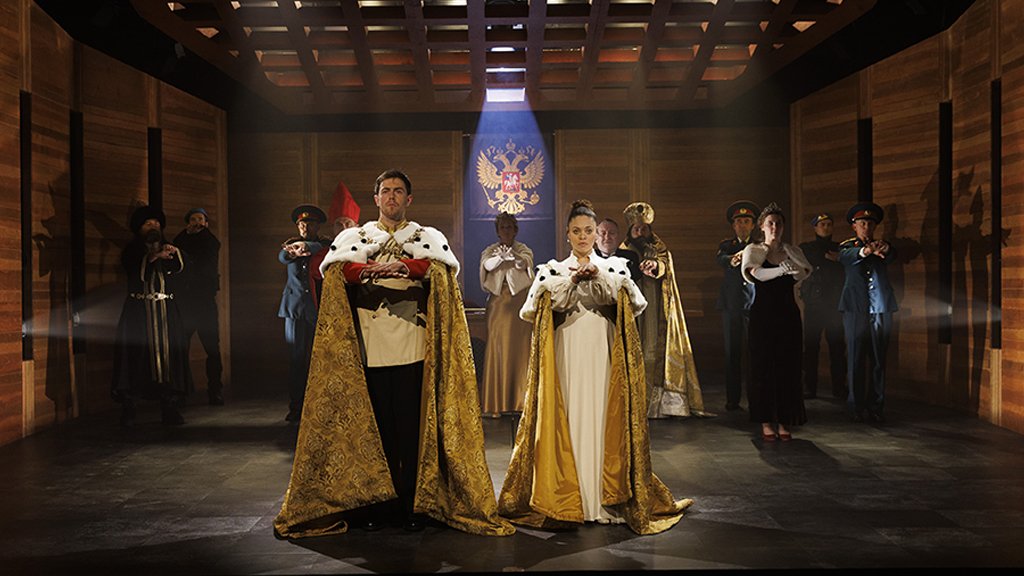
“Dmitry” in Marylebone theatre. Photo: EllieKurttz
What attracted Schiller to the figure of False Dmitry is not difficult to guess. Philosopher of history and drama theorist, Schiller put forward his concept of the tragic hero. He was interested in controversial historical figures such as Mary Stuart, William Tell, Joan of Arc. According to Schiller, the tragic hero must be noble and convinced of the rightness of his goals. His inner world is always justified and morally beyond judgement. The hero’s decision is wrong. It leads to irreversible tragic consequences both for himself and for the history because the fate of the historical hero is inseparable from the fate of the people.
And although the play is not one of the unconditional artistic successes of Schiller the playwright, conceptually it turned out to be unusually consonant with the philosophy of Rudolf Steiner, a major religious thinker, historian, and scientist of the 20th century. In his later years, Steiner paid special attention to Russia. He called the Russians the people of Christ, the spiritual potential of humanity. Steiner looked at the subject as a historian and believed that the root cause of Russian troubles should be sought in the phenomenon of imposture – a special phenomenon that arose literally at the same time as the Russian state itself (if we consider the beginning of the unification of lands around not Kyiv, but Moscow). False Dmitry, who found himself on the throne against nature, led Russia down the wrong path. If Tsarevich Dmitry had survived, the whole history of the world might have looked different, Steiner thought eccentrically.
Read also: Alexander J Gifford “We’re standing up for Russian culture”
Schiller’s play, like Steiner’s reflections, could remain curious attempts to read a familiar plot, equal among others, if Russia, as usual abruptly and suddenly, did not find itself in February of this year in the centre of negative attention of the whole world. The modern agenda has sharply updated reflections on the fate of Russia and its place in the world, making the performance an acutely timely and unprecedentedly bold example of artistic comprehension of the current political crisis.
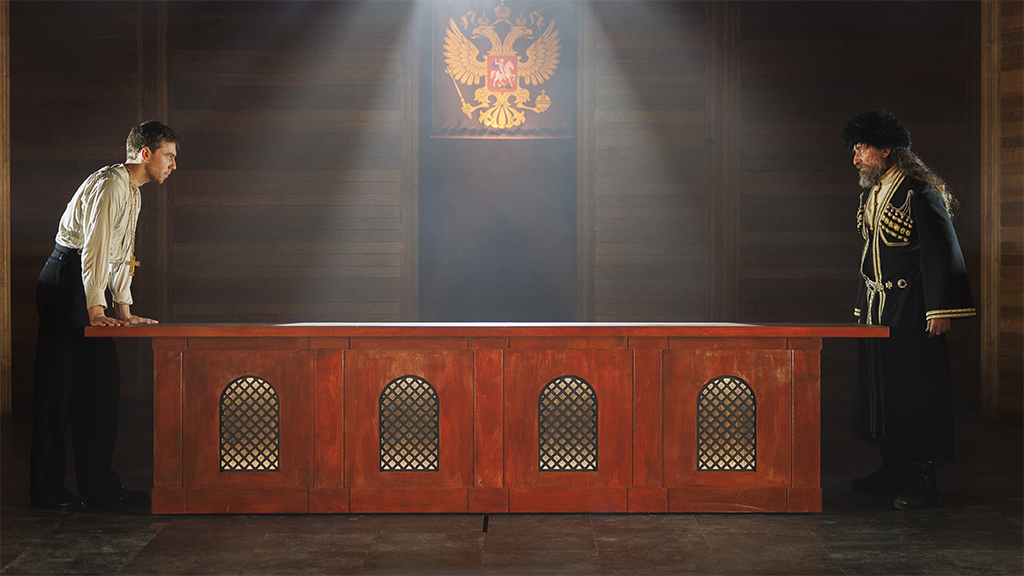
“Dmitry” in Marylebone theatre. Photo: EllieKurttz
The scenery by Robert Hopkins is laconic and functional. It hints at the time and place of action at a distance, not directly. The hall, sheathed with wood, the table and the tribune will accommodate the State Duma, the Sejm, and the church narthex. Signs of the Russian Empire, Soviet times and yesterday flash by. Another thing is important – we are in a state government office, and in this place, everything is not good at all (a musical overture sounds in pure Russian – Catastrophic p …. c, by Pneumoslon)
On stage we see a meeting of the Polish parliament – Sejm. The nobles are vigorously discussing Dmitry (played by Tom Burne) – a young Russian, declaring that he is a miraculously saved prince, the legitimate son of Ivan the Terrible and the true heir to the Russian throne. The ruler in Moscow, Boris Godunov – Daniel York Law – a former slave, Tatar, son-in-law of Malyuta, does not enjoy the love of the people. In Poland, the idea arises to support young Dmitry, whoever he may be, to establish his influence in Russia and convert the country to Catholicism.
The speeches of a young man in a simple soldier’s military uniform sound noble and ardent. He is convinced that he is right and is obsessed with a high purpose. Dimitri had not yet finished his speech, but the Polish cardinal (splendidly played by James Ganon) already had a plan. He removes the font cross from Dmitry – proof of his origin, in order to send it to the mother of Tsarevich, Maria, to enlist her support. Prince Mniszek (Mark Hadfield) informs the cardinal that he is ready to finance the campaign if his daughter Marina becomes the Russian Tsarina, but declares that additional support from the Vatican will be needed: troops are needed to fight Russia.
Before us is a very cynical political exposition. The old formula “the whole world is a theatre” here becomes a theatre of military-political passions and intrigues.
The director of the play, Tim Supple, has an impeccable command of the language of Shakespeare’s chronicles. The space of the spectacle is mobile and fluid. Scenes change like a kaleidoscope. Before our eyes appears the unvarnished matter of history: court conspiracies, boyar rebellions, a bloody struggle for power. The only one thing is missing – there is no people. Natural life is cancelled.
The performance employs about twenty actors, which allows mass scenes to work, an important element for a historical drama. Mike Ashcroft, the motion designer, achieved impressive results in the play. Take, for example, a bomb explosion. Bach! – both actors and objects crumble into a spectacular and monstrous news frame from Ukraine …
Meanwhile, the messenger hurries to the monastery, where the mother of Tsarevich Dmitry Maria is imprisoned. In her isolation, away from political intrigue, she suddenly gets the opportunity to return to the big game. Maria Nagaya immediately decides to exploit the situation and runs away from the monastery.
The army of False Dmitry attacks a city on Russian border. Maria’s presence transforms the whole situation. A political, intelligent woman (played with an intense presence by Poppy Miller), she managed to convince the Russian officers to swear allegiance to her “son”.
The theme of love for a political drama is complex. To endow the protagonist with the ability to love means to humanize and morally justify. If he is a successful lover, then there is hope for happiness for his people.
None of the women – neither the mother nor the bride – have any feelings for Dmitry. He is an object, like a font cross passing from hand to hand. Marina Mnishek (played by Aurora Dawson-Hunt) from the very first scene presents herself as an ambitious girl, thirsting for kingship. In relation to Dmitry, nothing personal at all: no contempt, no love. But she, too, is a toy in the hands of her father, the father is used by the Polish Church, and the Polish Church is pushed aside by the Orthodox Patriarch. The Polish army flees, leaving former allies – the Don Cossacks – in the line of fire, Boris Godunov commits suicide. Everything is coming to an end.
The last scene of the play – Dmitry’s mother remembers her natural son. She dreams of a boy (played by charming and touching Freddie Beck / 12 y.o). In a fit of hysteria, Maria is trying to save little Fedor, the son of Boris Godunov, since she did not save her own. The boy is killed. Dimitri asks Maria to see Dimitri’s reflection in his eyes. But nature cannot be deceived.
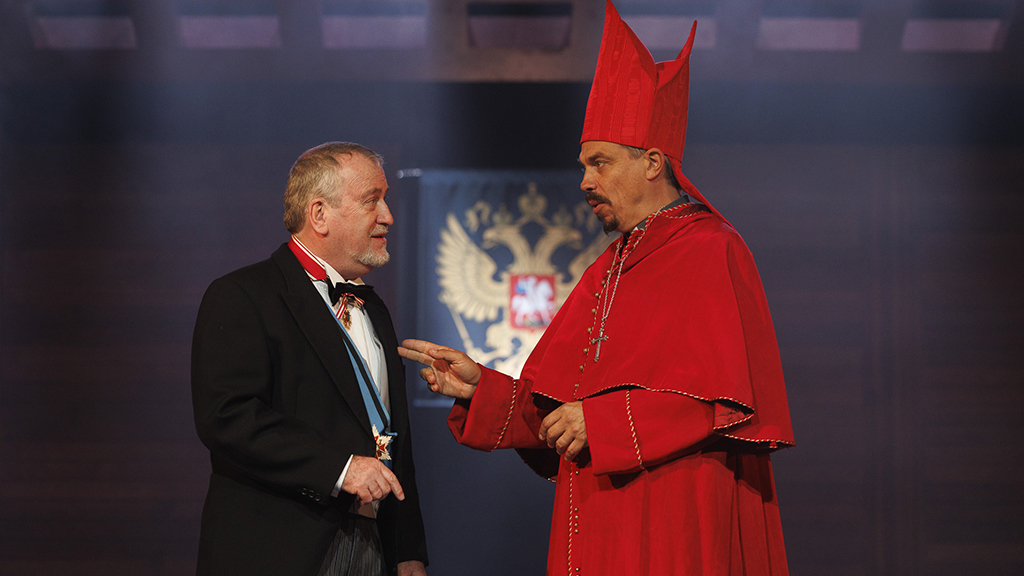
“Dmitry” in Marylebone theatre. Photo: EllieKurttz
Dmitri, compromised by Polish allies who wanted to convert Russia to be a Catholic country, was perhaps the first stone of the wall erected between Russia and the Western world, the source of the current paranoia of the Russian president.
Along the cliff by Vladimir Vysotsky is playing. And it seems that we have already fallen off that cliff.
- Marylebone Theatre
- 29 September – 5 November
- Details and tickets
For Afisha.London readers gets the special price for any performance and time – use the code AFISHA10 to get friendly discount for the play.
Photo on cover: EllieKurttz
Read Also:
The secrets of the British Museum: the evidence of the Bible
Innovator and romantic Vladimir Nabokov in Britain
Elizabeth II and Russia: a visit to Moscow, a box for Yeltsin and the impressions of eyewitnesses
SUBSCRIBE
Receive our digest once a week with quality Russian events and articles


